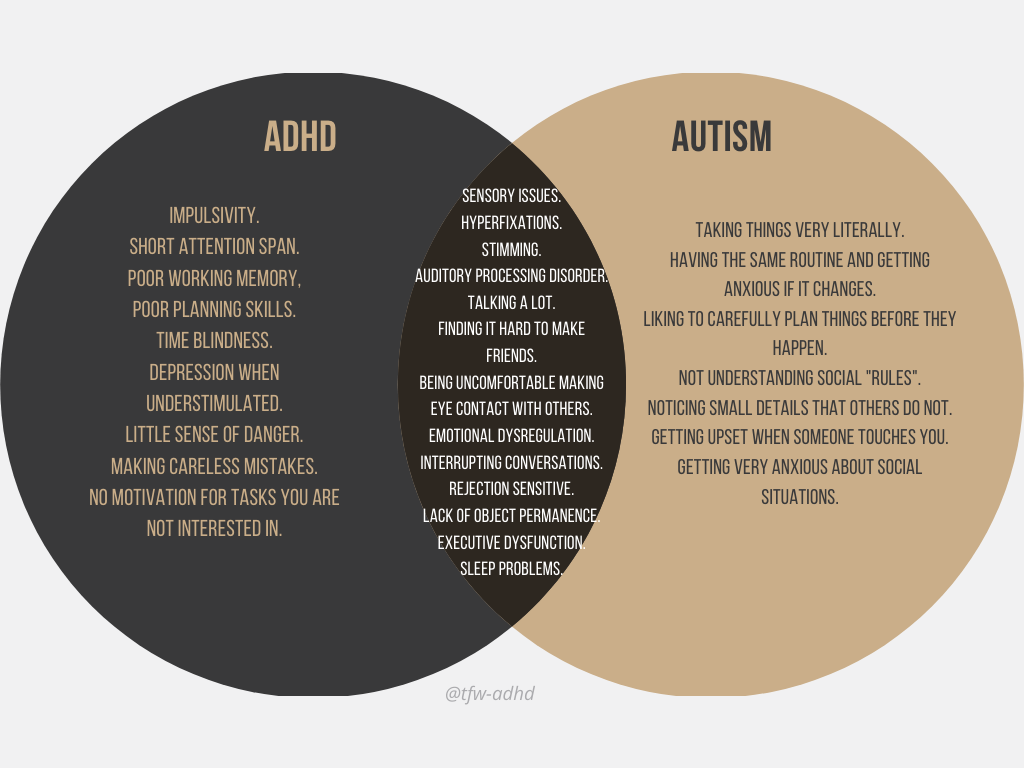.jpg)
In the case of neurodevelopmental disorders, Autism Spectrum Disorder (ASD) and Attention-Deficit/Hyperactivity Disorder (ADHD) have garnered significant attention. These conditions affect millions of individuals worldwide, with overlapping characteristics that often lead to confusion and misdiagnosis. Exploring the intricate link between Autism and ADHD can unravel fascinating insights into their shared features, potential causes, and implications for diagnosis and treatment.
Join us on a scientific journey as we delve into this captivating relationship.
Understanding the Basics: Autism and ADHD Defined
Autism Spectrum Disorder (ASD) is a complex neurodevelopmental condition characterized by persistent challenges in social interaction, communication, and restricted or repetitive patterns of behavior. Attention-Deficit/Hyperactivity Disorder (ADHD), on the other hand, involves difficulties with attention, hyperactivity, and impulsivity. While they are distinct diagnoses, they often co-occur, and the overlap between the two has piqued the curiosity of researchers.

Common Features and Overlapping Symptoms
A significant number of individuals with ASD also exhibit symptoms of ADHD, making it crucial to identify the common features between the two disorders. Both ASD and ADHD share challenges in attention regulation, executive functioning, and impulse control. Difficulties in social interactions, communication, and restricted interests can be present in both conditions, although they manifest differently.

Unraveling the Shared Neurobiology
To comprehend the link between Autism and ADHD, scientists have been studying the underlying neurobiology. Recent research suggests that both disorders involve alterations in brain structure, connectivity, and neurotransmitter systems. Dysfunctions in the prefrontal cortex, striatum, and cerebellum have been implicated in both ASD and ADHD. Additionally, genetic and environmental factors contribute to the development of these conditions, further accentuating their connection.
Both Autism and ADHD are believed to have a strong genetic component, with heritability estimates ranging from 70-90% for Autism and 70-80% for ADHD.
Diagnosis and Challenges
The coexistence of Autism and ADHD poses unique challenges for accurate diagnosis. Due to overlapping symptoms, clinicians need to carefully assess individuals to differentiate between the two disorders. Accurate diagnosis is essential to provide appropriate interventions and support. Advancements in diagnostic tools and comprehensive assessment methods are helping professionals better identify the nuances and complexities of these conditions.
Implications for Treatment and Support
Understanding the relationship between Autism and ADHD holds promise for tailoring effective interventions. Approaches that address shared challenges in attention, executive functioning, and social skills can benefit individuals with both disorders. A multi-disciplinary approach, including behavioral therapy, educational support, and medication when appropriate, can significantly improve outcomes and enhance the quality of life.
Conclusion
The intricate link between Autism Spectrum Disorder (ASD) and Attention-Deficit/Hyperactivity Disorder (ADHD) offers a captivating glimpse into the realm of neurodevelopmental disorders. By recognizing the shared features, investigating the underlying neurobiology, and addressing the challenges of diagnosis and treatment, we can better support individuals with these conditions. The journey of understanding Autism and ADHD is ongoing, with ongoing research shedding light on new insights that can pave the way for improved interventions and enhanced lives.

Frequently Asked Questions (FAQs)
1. Are Autism Spectrum Disorder (ASD) and Attention-Deficit/Hyperactivity Disorder (ADHD) the same thing?
No, ASD and ADHD are distinct disorders. However, they often co-occur, and many individuals may exhibit symptoms of both conditions.
2. What are the common features between Autism and ADHD?
Both ASD and ADHD share challenges in attention regulation, executive functioning, and impulse control. Difficulties in social interactions, communication, and restricted interests can also be present in both conditions, though they may manifest differently.
3. Is there a biological basis for the link between Autism and ADHD?
Yes, recent research suggests that both disorders involve alterations in brain structure, connectivity, and neurotransmitter systems. Dysfunctions in specific brain regions, such as the prefrontal cortex, striatum, and cerebellum, have been implicated in both ASD and ADHD.
4. How can the connection between Autism and ADHD impact diagnosis?
The coexistence of Autism and ADHD presents challenges for accurate diagnosis due to overlapping symptoms. Careful assessment by clinicians is essential to differentiate between the two disorders, as accurate diagnosis is crucial for providing appropriate interventions and support.
5. What are the implications for treatment and support?
Understanding the link between Autism and ADHD can guide the development of tailored interventions. Approaches addressing shared challenges in attention, executive functioning, and social skills can benefit individuals with both disorders. A comprehensive, multi-disciplinary approach, including behavioral therapy, educational support, and medication when appropriate, can significantly improve outcomes and enhance the quality of life.


.png)


